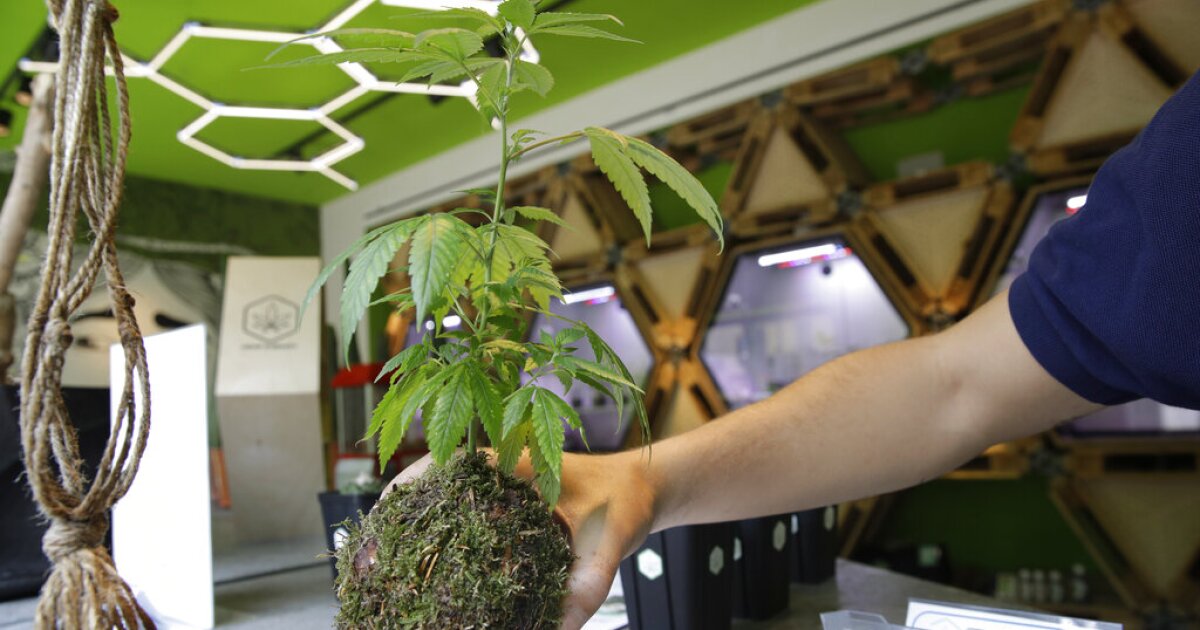

Voters in Arkansas, Maryland, Missouri, North Dakota, and South Dakota will consider marijuana-related ballot measures this November deciding whether the drug will be allowed recreationally.
The five states have ballot initiatives that, if passed, will legalize marijuana for those ages 21 and older, joining a growing number of states that have made moves toward legalizing the drug in recent years.
THE FIVE STATES THAT WILL HAVE ABORTION MEASURES ON THE BALLOT IN NOVEMBER
Thirty-seven states have laws on the books already regulating marijuana for medical use, according to NORML. Marijuana is legal for recreational use in 19 states, Washington, D.C., and Guam. Additionally, 27 states have partially or fully decriminalized some marijuana possession offenses. Decriminalization across states typically means that penalties for possessing small amounts of marijuana will be similar to that for a traffic violation for first-time offenders, with no arrest, jail time, or criminal record.
Earlier this month, President Joe Biden announced he would pardon thousands of people with federal offenses for a simple possession of marijuana, meaning they were caught with a small amount of the drug with no intent to sell or distribute it. He also directed Health and Human Services Secretary Xavier Becerra to review how marijuana is classified under federal law. It is listed as a Schedule 1 drug, meaning that it has a “high potential for abuse,” along with heroin, LSD, and ecstasy.
As more states decide if and how marijuana should be regulated, Arkansas, Maryland, Missouri, North Dakota, and South Dakota will put it before voters to voice their opinions.
Arkansas
Voters in Arkansas will weigh in on ballot Issue 4 that would legalize the possession and use of up to 1 ounce of marijuana for people 21 years of age and older without the need for a medical ID.
Under the measure, though, growing marijuana in one’s home would not be authorized. It would also make changes to the state’s medical marijuana program that voters approved of in 2016, removing some residency requirements to qualify. Localities would be able to prohibit retail sales of marijuana in their area through election.
Licensed dispensaries in the state could start selling recreational marijuana as soon as March 8, 2023, if the measure is approved. Forty additional dispensary licenses would be issued by state regulators for recreational adult-use marijuana sales, as well as 12 cultivation facility licenses. If the measure is shot down, then no changes will be made. Arkansas already has a medical marijuana law on the books.
Maryland
Maryland voters will decide whether to approve Question 4, which would legalize marijuana for adults 21 and older beginning in July 2023 and require the state legislature to enact laws surrounding the use, distribution, possession, regulation, and taxation of recreational marijuana in the state.
“Do you favor the legalization of the use of cannabis by an individual who is at least 21 years of age on or after July 1, 2023, in the State of Maryland?” the question reads.
If the measure is passed, adults will be legally allowed to possess up to 1.5 ounces of marijuana. People found possessing between 1.5 ounces and 2.5 ounces of marijuana would be subject to civil fines, and any higher amounts would have criminal penalties. People who have past convictions that would be legal under the new law would have them expunged, and those serving time would be eligible for resentencing.
If the measure fails, then no changes will be made to the state’s marijuana laws. Maryland currently has a medical marijuana program in place.
Missouri
Amendment 3 asks Missouri voters whether to amend the state constitution to allow people 21 years and older to possess, purchase, consume, and cultivate marijuana, removing current state bans.
The measure would automatically expunge some people’s criminal records with nonviolent marijuana-related offenses and place a 6% state tax on retail sales of marijuana, which will cover administrative fees, and any extra will go toward veterans’ healthcare, drug addiction treatment, and similar efforts. Local governments could also levy up to 3% in taxes on sales. Local jurisdictions can also opt out of allowing retail sales through a vote of the people.
Additionally, if approved, the amendment would strengthen the state’s existing medical marijuana program by allowing ID cards to remain valid for three years rather than one.
South Dakota
South Dakota voters will decide on the Marijuana Legalization Initiative that would legalize the possession, distribution, and use of marijuana for people at least 21 years old. People would be allowed to possess or distribute up to 1 ounce of marijuana.
South Dakotans for Better Marijuana Law, a proponent of the measure, gathered enough valid signatures to place it on the ballot earlier this year. Voters previously approved Amendment A in 2020, with 54% of the vote, that would have legalized recreational use of marijuana, but it was later overturned by the state Supreme Court, which ruled that the amendment violated a requirement that it only cover one topic.
The sections of the amendment’s language that were previously challenged in court by Gov. Kristi Noem (R-SD) and some law enforcement officials have been removed in the new initiative, including ones that dealt with taxes, leaving it up to the state legislature. Medical marijuana has been regulated in the state since voters approved it in 2020.
North Dakota
Citizen-propelled Statutory Measure 2 will be on the ballot for North Dakota voters this November. If passed, it would allow adults 21 and older to purchase and possess up to 1 ounce of marijuana and also permit residents to grow up to three marijuana plants.
The state’s Department of Health and Human Services would be put in charge of establishing rules surrounding regulation by Oct. 1, 2023. The department would be allowed to authorize up to 18 retailers and seven cultivation facilities.
CLICK HERE TO READ MORE FROM THE WASHINGTON EXAMINER
New Approach ND, a group of the state’s residents supportive of legalizing marijuana, collected enough signatures to place the measure on the ballot earlier this summer. Under the measure, local jurisdictions could prohibit marijuana retailers from operating in their area. Voters previously rejected a similar legalization measure in 2018.







